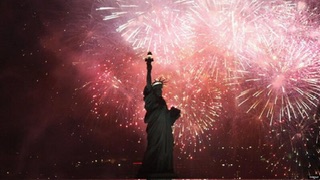
Never forget what this day represents to all Americans and the remaining folks of the free world. Liberty and justice for all.
We often recite these words in classrooms and at civic gatherings. When we pronounce the pledge, is it merely an obligatory ritual or do we listen attentively to all of the words and take them seriously?
The last words of the pledge are perhaps some of the most countercultural words of commitment we can speak: “with liberty and justice for all.”
Our ancestors envisioned a nation wherein liberty and justice would be for all people. On July 4, 1776, the 13 colonies adopted the Declaration of Independence, asserting American sovereignty from Great Britain. On the anniversary of our nation’s birth, we salute the men and women, past and present, who have selflessly served our nation.
For some, however, “liberty” has been reduced to a license for self-centeredness, and “justice” has been diminished to mere retaliatory or punitive action.
Although dictionaries routinely define liberty as “the state of being free,” liberty involves much more.
The historical American concept of liberty is not that one is free to do as one pleases without accountability for the consequences of one’s actions.
Rather, our heritage of liberty means that we are not owned or enslaved by another person or by the power of a king, emperor, or Monarch.
In other words, our individual and corporate freedom exists within ethical and moral responsibility boundaries.
True liberty calls on us to express ourselves with civility and to respect the rights of those who think differently to do the same.
Justice is commonly perceived as “the assignment of merited rewards or punishment.” Justice strives to create opportunities for all persons to succeed economically, vocationally, and socially. Real justice seeks to create opportunities for everyone including the disadvantaged.
This year’s July 4 festivities should serve as a reminder that we must all pledge ourselves to continue to work for liberty and justice for all persons everywhere on earth.
The words of the pledge—"with liberty and justice for all"—hold profound significance beyond mere recitation. They encapsulate fundamental ideals that Americans and many around the world cherish deeply.
Liberty as rightly pointed out, isn't just about personal freedom devoid of consequences; it encompasses responsibility and respect for others' freedoms. It's about being free from oppression and coercion, ensuring everyone can live their lives with dignity and opportunity.
Similarly, justice extends far beyond punitive measures; it embodies fairness, equal opportunity, and the protection of rights for all individuals, including those who are marginalized or disadvantaged.
Reflecting on these ideals is crucial, especially on July 4th, as it serves as a reminder of our ongoing commitment to these principles. It's a call to action, urging us to continually strive towards a society where liberty and justice are accessible to every person, regardless of their background or circumstances.
In essence, the pledge is not just a ritualistic recitation but a solemn vow—a commitment to uphold these values and actively work towards realizing them in our communities and beyond.